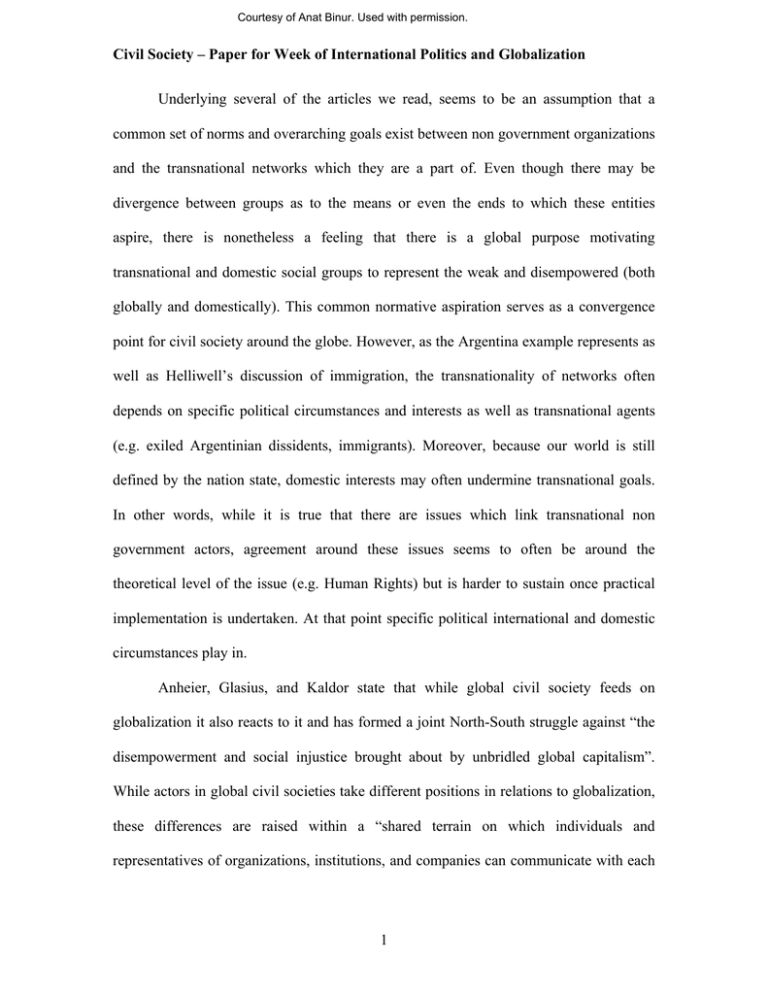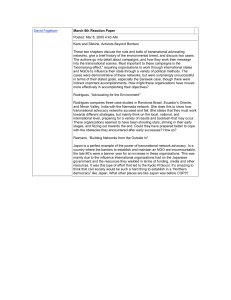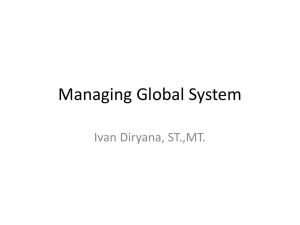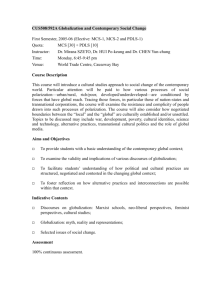Civil Society – Paper for Week of International Politics and... Underlying several of the articles we read, seems to be... common set of norms and overarching goals exist between non...
advertisement

Courtesy of Anat Binur. Used with permission. Civil Society – Paper for Week of International Politics and Globalization Underlying several of the articles we read, seems to be an assumption that a common set of norms and overarching goals exist between non government organizations and the transnational networks which they are a part of. Even though there may be divergence between groups as to the means or even the ends to which these entities aspire, there is nonetheless a feeling that there is a global purpose motivating transnational and domestic social groups to represent the weak and disempowered (both globally and domestically). This common normative aspiration serves as a convergence point for civil society around the globe. However, as the Argentina example represents as well as Helliwell’s discussion of immigration, the transnationality of networks often depends on specific political circumstances and interests as well as transnational agents (e.g. exiled Argentinian dissidents, immigrants). Moreover, because our world is still defined by the nation state, domestic interests may often undermine transnational goals. In other words, while it is true that there are issues which link transnational non government actors, agreement around these issues seems to often be around the theoretical level of the issue (e.g. Human Rights) but is harder to sustain once practical implementation is undertaken. At that point specific political international and domestic circumstances play in. Anheier, Glasius, and Kaldor state that while global civil society feeds on globalization it also reacts to it and has formed a joint North-South struggle against “the disempowerment and social injustice brought about by unbridled global capitalism”. While actors in global civil societies take different positions in relations to globalization, these differences are raised within a “shared terrain on which individuals and representatives of organizations, institutions, and companies can communicate with each 1 Civil Society – Paper for Week of International Politics and Globalization other, can engage in common dialogue”. In addition, for them to be part of civil society means a commitment to common human values that go beyond ethnic, religious, or national boundaries. While they agree that it is not clear where or how the boundaries of the values that global civil society is said to represent are drawn, the term global civil society nonetheless has a normative aspiration to it. As will be discussed below, the agreement around a normative framework may not sustain transnational networks and may depend on specific domestic and international circumstances. In addition to the Anheier article approach, Helliwell sees the relationship among social capital of different kinds as complementary rather than competitive. Furthermore, he believes that enhancing international cooperation between civil society networks can be done without threatening the nature and value of local organizations and interests. However the question can be reversed – not whether cooperation on the international level undermines local goals, but rather will domestic interests undermine the ability to cooperate on the international non government level. As stated, and as is represented in the Argentinian case brought in the Brysk article, for domestic organizations to be joined within transnational networks certain circumstances need to take place. First the issue at stake needs to become pertinent for the international realm. While it is true that one could claim that non government organizations have the ability to define and impact international agendas, for this to happen groups need to first find partners on the international level which agree to advocate the issue. In the case of Argentina, human rights issues were at a peak and enthusiastically advocated by Carter. Once Argentina democratized, the issues of human rights violation were left to the domestic realm. Therefore, while it was still vital for 2 Civil Society – Paper for Week of International Politics and Globalization Argentinean organizations to gain from the weight and resources of transnational networks, these no longer saw the issue with the same priority as Argentineans. So while a general agreement between the transnational actors may exist as to the importance of human rights, the prioritization of issues within this subject and the definition of domestic sovereignty may diverge between the actors. Agreement around overarching normative concepts may not serve as string enough basis for implementation within specific cases. Groups which feel that their definition of the issue differs from their global actors or that their interests are no longer properly represented may vouch out. Second, the Argentina example emphasizes the importance of direct representation of interests in transnational frameworks. If it were not for the exiled Argentinean dissidents in the US and other countries, the issue of human rights violations in Argentina may not have been promoted to such an extent. Helliwell, also states that migrants provide for trust between international networks thereby creating a missing and important link for the establishment of globe spanning networks. This points to another example where joint goals and norms can be created but often depend on direct interest representation and on specific circumstances. Moreover, it is domestic agents which travel abroad in both the Argentina case and the Helliwell article which create the bridges. So it is not the agreement of non government actors around overarching issues which promotes transnational networks but the existence of direct representation and a convergence of interests which allows the links to be formed. One may also claim that although agreement between transnational actors may be reached around overarching normative ideals, domestic interests will often override and undermines these ideals and their implementation. Example are the issues of labor rights 3 Civil Society – Paper for Week of International Politics and Globalization and trade. On the international level, negotiations between domestic and international actors as well as socioeconomic global circumstances may have led to the highlighting of labor rights issues. However, domestic circumstances translate the meaning of labor rights in ways which may fragment the international definition and joint agreement. Domestic unions’ interests in fighting for their own workers will take precedence over international global concepts which may undermine such interests. Domestic unions will have an interest in undermining possibilities of outsourcing even if it would mean hurting the rights or gains of laborers abroad. Another example is the issue of trade – while non government actors may agree on the importance of development and raising the standard of living in third world countries through enhanced bilateral and multilateral trade, domestic actors will often promote their own interests first. Therefore, farmers, small businesses, laborers may refuse to participate in coalitions which will result in an undermining of their own position. Environmental issues serve as another issue where domestic circumstances and interests limit the depth of agreement in the international realm. Where poverty is dire, non government actors may agree theoretically that the environment is a key issue however may join with their government in postponing environmental action in order to advance development. In conclusion, agreement within transnational networks on broad normative ideals may exist, however it often depends on specific international and domestic circumstances. Moreover, the practical implementation of this ideas necessities an of alignment of domestic interests and the appropriate agents to represent them. 4 Civil Society – Paper for Week of International Politics and Globalization Anat Binur 1,121 words 5





